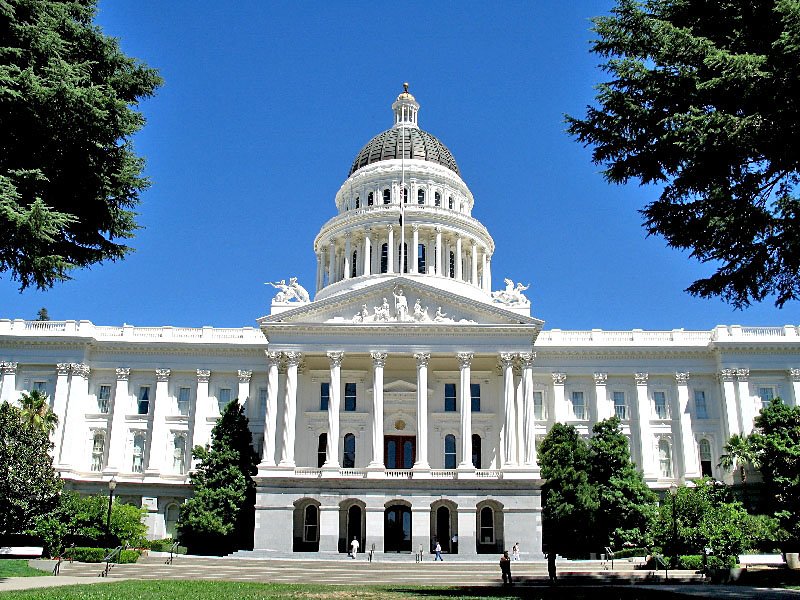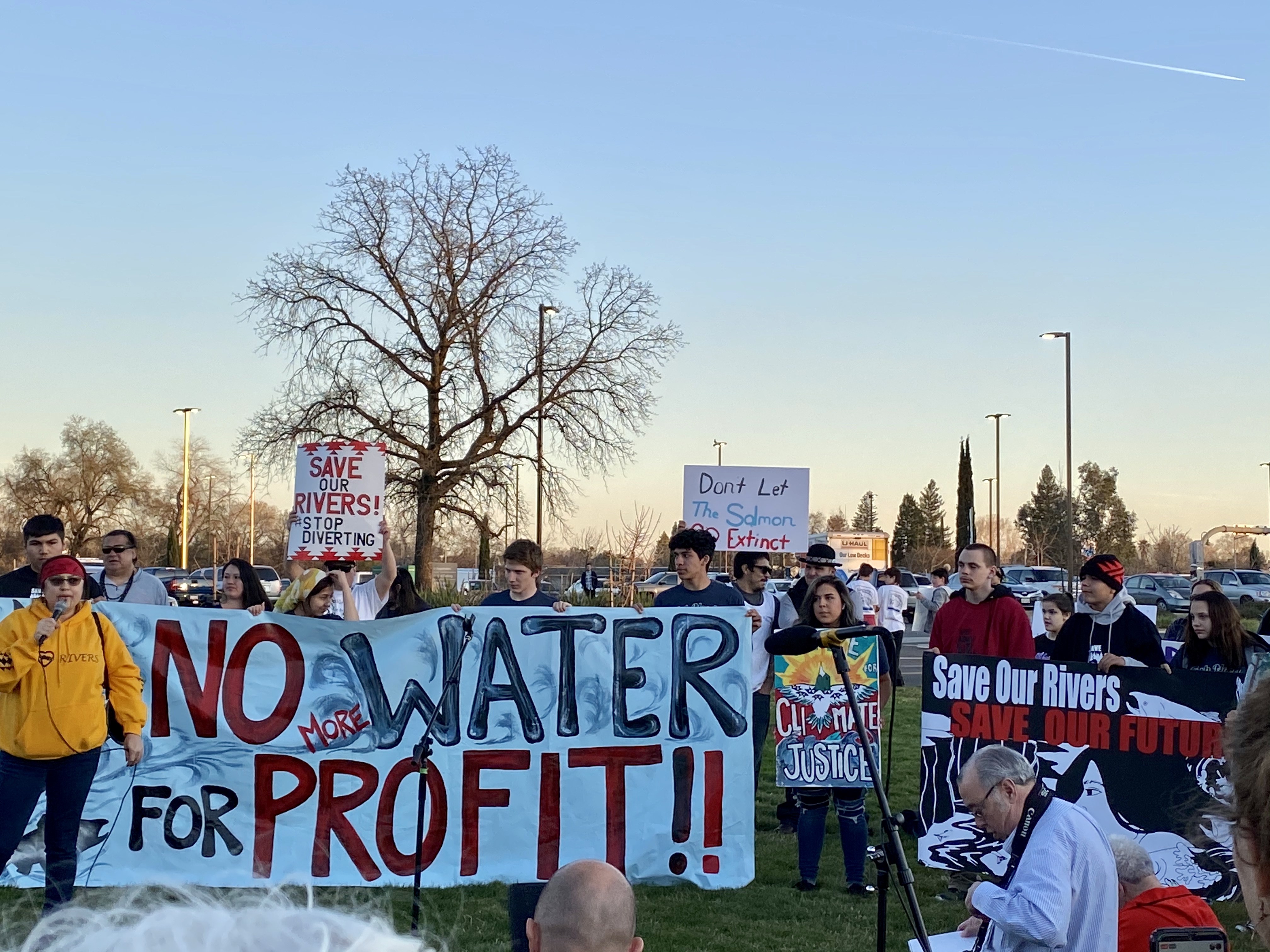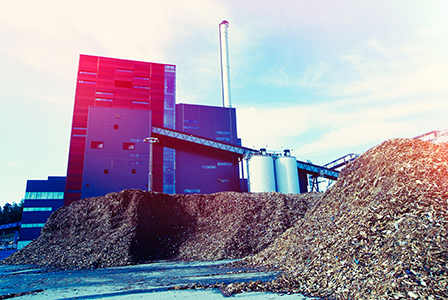
Legislative Action Season Has Begun
Activists Speak Out Across the State Against Delta Tunnel
Sign Up for a Moving Beyond Incineration Webinar
By Kathryn Phillips

The heart of the second year of this two-year legislative session has arrived in California.
On February 21, the deadline for legislators to submit new bills came and went. Using a handy bill-tracking subscription service, our staffer Daniel Barad sifted through all the introduced bills and determined that about 650 of them had some environmental issue content.
From early February to March 13, Daniel and our two policy advocates, Lauren Cullum and Brandon Dawson, analyzed and researched those bills and compiled recommendations for Sierra Club California positions.
Fortunately, a huge number of those bills are so-called “spot” bills. Those are bills that haven’t yet been developed and may very well not become full-fledged environmental issue bills. They are often placeholders for other issues and don’t require a lot of attention now.
On March 14, our legislative committee, composed of top volunteers with strong backgrounds in specific policy issues, went over the bill list with staff and settled on positions.
Sometime within the next week, we’ll compile and post a list of priority bills on our website (sierraclubcalifornia.org).
This month, at the state Capitol, policy committee hearings have already begun for some bills. Typically an environmental bill goes through one and sometimes two policy committees. If it clears policy committees, but the proposed legislation would require the state to spend money, the bill will also have to clear the appropriations committee before it gets to the floor for a vote.
Once it clears the floor, the bill starts that process all over again in the second house.
Because this is the second year of a two-year session, there are still some bills left from last year that are awaiting action on the floor of the second house. That includes the very important plastic waste reduction bills, AB 1080 and SB 54.
Those bills, like the other bills that have just been introduced, have until August 31 at midnight to get out of the legislature. Between September 1 and early October, the bills that clear the legislature must be signed by the governor before becoming law.
If this year is like the average year, between 100 and 125 bills that we’ve taken positions on will land on the governor’s desk. About 90 percent of those usually are signed into law.
Throughout this process, Sierra Club California staff identifies times when a push from legislators’ constituents can make a difference. At those critical moments, you’ll receive emails, texts or calls asking you to contact your assembly member or senator about a bill.
Legislators do care what constituents think, and your responses to our alerts will help us push good bills and stop bad bills.
Activists Speak Out Across the State Against Delta Tunnel

Sierra Club California activists and allies showed up in force around the state to voice opposition to a plan for a tunnel that would divert water from California’s largest estuary.
At eight meetings in February and March, held from Los Angeles to Redding, the state Department of Water Resources (DWR) listened to comments from communities in the agency’s first official step to prepare an environmental impact report about the proposed tunnel.
Officially known as the “Delta Conveyance Project”, the latest tunnel proposal is the Newsom administration’s rendition of projects formerly known as the Peripheral Canal, the Bay Delta Conservation Plan, and the Waterfix.
The same agency pushing all of those plans, DWR, is now proposing a single tunnel that would be expensive, create new environmental and environmental justice problems, and not--in a time of climate change--produce new water for the cities and farms south of the Delta that import Delta water.
Each of the eight meetings began with a short presentation about the project by DWR staff and then moved into public comment. Virtually every meeting was packed and tunnel opponents--including Sierra Club activists--dominated the comment time. Their main message was that any environmental analysis must consider a “no tunnel” option.
At the first meeting in Sacramento on February 3rd, indigenous groups and tribal communities who live along the Klamath and Trinity Rivers drove upwards of five hours to attend the meeting. They raised concerns that there were no meetings scheduled further north, closer to the headwaters that feed into the Sacramento River that flows into the Delta.
Fortunately, DWR listened and added an additional scoping meeting in Redding on March 2. There, more than 200 people, including tribal members, overflowed from the meeting room and called on DWR to dump the tunnel idea.
Likewise, meetings held closer to or in Delta towns drew hundreds of concerned residents, including families, farmers and fishing people. At the February 13 meeting in Stockton, youth and teen activists channeled their creativity through song and poetry to speak out against the proposed project. Restore the Delta made a short video of some of the public comments given at the meeting that can be viewed here.
No additional meetings are planned. But there is still a chance to get your comments in. The public comment period for the Notice of Preparation closes on March 20 at 5pm. Here's how you can submit written comment:
-
Via email: DeltaConveyanceScoping@water.ca.gov
-
Via Mail: Delta Conveyance Scoping Comments, Attn: Renee Rodriguez, Department of
Water Resources, P.O. Box 942836, Sacramento, CA 94236
Sign Up for a Moving Beyond Incineration Webinar

If you’ve ever wondered what the solutions are to deal with woody waste while avoiding the negative impacts of biomass incineration, you’re in luck.
This month, Sierra Club California will be hosting two webinars on our Moving Beyond Incineration report. Click one of these two options to register today:
As Sierra Club California continues to fight for the preservation of our forests, we recognize that current forest practices in California will result in the accumulation of a large amount of wood material, or woody biomass, for years to come.
To combat the status-quo practices of burning biomass in piles or in dirty, antiquated biomass incinerators, Sierra Club California released its Moving Beyond Incineration report in November of last year. The report highlights the negative impacts of biomass incineration and outlines low-impact uses for woody biomass.
California’s existing biomass incinerators contribute to the climate crisis, worsen local air quality and displace opportunities for clean, non-polluting renewable energy. . If the state is going to invest in uses for woody biomass, it should identify and prioritize the cleanest, most sustainable options.
Sign up for a Moving Beyond Incineration webinar today to find out why the status quo of using old incinerators is unacceptable and what the state can and should do to responsibly dispose of and use woody biomass.
Follow Us:
  |
Thank you for being a part of our work! Consider making a monthly donation. You may securely donate online or by sending a check to Sierra Club California at 909 12th Street, Suite 202, Sacramento, CA 95814.
